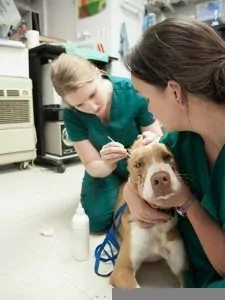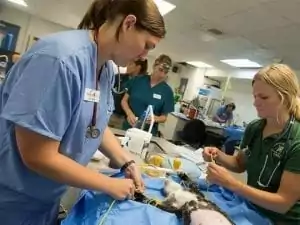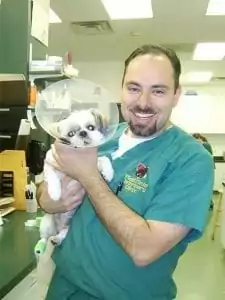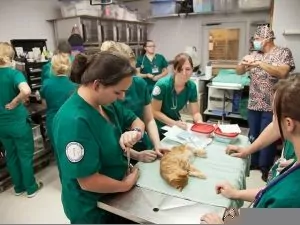In the UK, there are two veterinary professions – veterinary surgeons and veterinary nurses.
Veterinary nurses also go through a degree that lasts 3 to 4 years and has a series of tests and exams, with a strong focus on practical skills. Vet nurses may be similar to USA “vet techs”, although there may be some key differences! See if you can spot them!
What are vet nurses in the UK trained to do?
In the UK, vet nurses have a lot of different roles in practice. Vet nurses receive extensive training and can, therefore, perform a series of technical procedures. These are procedures like drawing blood, placing catheters or administering intra-muscular medication.
However, vet nurses may also position patients and perform x-rays (sedation is often used in the UK as radiation laws do not allow you to be holding animals unless there are specific concerns) and they have a very important role during anesthesia monitoring.
Day-to-day tasks
In clinical practice, a nurse will often be responsible for cleaning and sterilizing equipment and rooms. In the UK, it’s common practice for nurses to monitor anesthesia while the vet is performing surgery. Nurses receive extensive training on anesthesia planes, monitoring equipment, the anesthesia machine and what to do when things don’t look right. The nurse cannot decide what to do (that is a vet’s choice), but a good nurse will spot on signs of “trouble” before trouble really happens. Nurses can also administer medication, including anesthesia, as long as it’s a fixed quantity that the vet has prescribed.
As if that wasn’t responsibility enough, in the UK nurses may also specialize further and many places run “nurse clinics”. Nurse clinics can be specific, such as geriatric patient clinics, diabetes clinics, obesity clinics or behavior clinics. They may be charged for too, so nurses can contribute to practice income!
One step further
Vet nurses in the UK also learn a lot about bandaging (chances are many will be better at that than the vet!). However, maybe more surprising, vet nurses can perform minor surgery as long as this has been delegated by the vet. In the UK, a vet can choose to delegate minor surgery not involving entry into a body cavity to a nurse. In practical terms, these are superficial lacerations and/or lump removals. Neutering is specifically not allowed to be performed by a vet nurse.
In some cases, because nurses are so into how the practice works, they become practice managers for that clinic or hospital and are responsible for ensuring everything runs smoothly.
In the end…
In the UK, vet nurses also need to undertake special training and pass that training in order to become “Registered Veterinary Nurses”, or RVNs. They actually have a lot of knowledge and responsibilities, and can be an invaluable asset when it comes to performing veterinary work, as they are often the “vet’s right hand”!
What can you find in your own country?
Read more about the Life as a Vet Nurse in the post from a Australian vet nurse on our blog!




